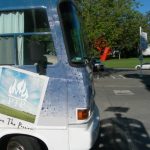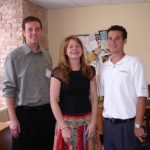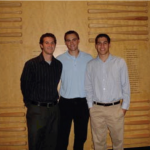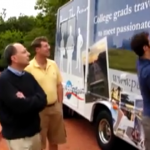“Wherever you go, there will always be a mixture of people destroying, helping and living mutually with the outdoors.” Ryan Barnes, a United States Park Ranger in the Yellowstone national forest, understands that not everyone was raised with the same appreciation and respect for the outdoors as himself. That is why, after three years of applications, he spends his days roving the basin surrounding Old Faithful, educating, protecting and perhaps just conversing, with those who choose to enjoy the national park.
 A self-described “modern-day drifter,” Ryan says, in his North Carolina drawl, “I love the outdoors and I love educating people.” The job is an excellent fit. Ryan gives talks to thousands of spectators, gathered before Old Faithful, warning of the dangers of the wilderness, not intending to scare anyone, but rather to inform the urbanites as to the realistic dangers they may face in the wild. Ryan stresses the importance of conservation, as without conservation, there can be no research. Ryan’s advice, to people who would like to follow his path, is that “if you want to do something, do it. There are no excuses.”
A self-described “modern-day drifter,” Ryan says, in his North Carolina drawl, “I love the outdoors and I love educating people.” The job is an excellent fit. Ryan gives talks to thousands of spectators, gathered before Old Faithful, warning of the dangers of the wilderness, not intending to scare anyone, but rather to inform the urbanites as to the realistic dangers they may face in the wild. Ryan stresses the importance of conservation, as without conservation, there can be no research. Ryan’s advice, to people who would like to follow his path, is that “if you want to do something, do it. There are no excuses.”
Interview: How I Became a National Park Ranger
I thought I could hold this mic, but then it’d be just too dang confusin’.
What’s your name, where you from?
My name’s Ryan Barnes, and I’m from North Carolina.
How did you end up out here in Yellowstone being a park ranger?
I’ve tried for three years trying to get a government job working with the park service and I finally landed one at the primo of all primo places. Old Faithful Yellowstone.
What were you doing before this?
I’m in grad school in right now. So I been working wilderness therapy and outdoor jobs and all sorts of stuff.
So what do you do?
Well, I do these talks. I answer visitors questions. Usually they’re the same questions over and over every day. Rove all this basin. Rove north here and make sure people aren’t jumpin’ in hot pools and stickin’ their hands in, and doing illegal acts.
So do you love your job?
Aww yeah. It’s pretty cool. There’s nothing I don’t like about it, sometimes it gets stressful, but, what job isn’t stressful?
So you’re in grad school right now doing this thing. How long do you hope to stay here or what do you plan to do?
I’m a modern day drifter. I just do whatever comes next.
Zach: What are you passionate about in this job?
I love the outdoors and I love educatin’ people. I would consider myself an educator.
Z: How long have you loved the outdoors for?
Since I was about nine inches long. I love the outdoors. Always have and always will.
B: So if you weren’t doing this, what would you be doing?
Hiking again. The AT. I did that last year.
What kind of advice would you give to anyone trying to get a position like this? Not necessarily a park ranger, but a position they’ve sought after and would like to be in?
Well if you wanna do sumthin’ just do it. Don’t complain about it just do it. That’s my opinion. No excuses.
It took you three years to get here. Was it persistence that got you here?
Yeah. Constantly applying for jobs and figurin’ out how to get better at resumes. Pursuin’ my education. Doing what I wanna do in between.
Zach: How important is the conservation aspect of all this to you?
Well I think it’s one of the most important things. If we hadn’t of conserved this, what else would we have conserved? What won’t we conserve. I mean, there’s researchers out here figurin’ out new stuff every day about thermofalls. Bacteria that live in hot water and animals and global warming and this that and the other. If you have a wilderness, it’s untouched by people. There’s no variables thrown in between about human influence.
Without conservin’ sumthin’, I mean, how are you going to do your research in the middle of a park? Or in the middle of a big city like New York City about tryin’ to figure out how wilderness is appropriate to people. You can’t do it.
That’s why you gotta to have wildernesses because there’s too many city people in this world. They don’t know what it’s like in the outdoors. And they’re away from it. I think every person needs to have some sort of wild instinct in ‘em. So many people don’t have it anymore. So it’s so many things. Aw man, it’s kind of a philosophical thing to me.
Z: How does that get harder? Yellowstone is getting more and more crowded. Is that ever a double edged sword where they have to limit the number of people they let in the park?
It is and it isn’t. At the same time, without the people, Yellowstone wouldn’t be preserved. But at the same time, people consider this place not their own. So they trash it and throw stuff in the hot pools and disrespect it. But there’s also people who like to go in the backcountry and go hiking and camping and researchers out here doing research. So no matter where you go, what you do, you’re always going to have a mix of people messing up, destroying, or being neutral to whatever environment you’re in.
B: Last question. Have you ever had an encounter with a grizzly bear here?
No. Just black bears.






